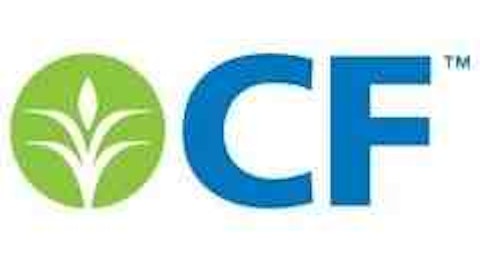The Motley Fool’s readers have spoken, and I have heeded their cries. After months of pointing out CEO gaffes and faux pas, I’ve decided to make it a weekly tradition to also point out corporate leaders who are putting the interests of shareholders and the public first, and are generally deserving of praise from investors. For reference, here’s my previous selection.

The fertilizer hits the fan
It may not be easy to see the good in the fertilizer sector these days, but if you look hard enough it’s there. Just two weeks, ago Russia’s Uralkali, the world’s largest producer of potash (a type of fertilizer), said it will end its cooperation in a potash price-fixing cartel and sell its production on the open market. Speculation from Wall Street analysts was that potash prices could fall by 25% or more simply because of a market glut of potash.
The news boded poorly throughout the entire sector. The smaller Intrepid Potash, Inc. (NYSE:IPI) was absolutely crushed, given that its second-quarter results, reported just one day after the Uralkali announcement, show that it derived 84.4% of its gross sales from potash, with the remaining sales coming from its langbeinite production. With less working capital and fewer available resources, Intrepid Potash is really just along for the ride.
If you think size matters, a spot price drop in potash prices will indiscriminately harm margins. Potash Corp./Saskatchewan (USA) (NYSE:POT) has seen the investment grade of its bonds fall further in wake of the Uralkali announcement, falling to BBB-, according to ratings agency Standard & Poor’s. That’s just one notch above speculative grade and could signal trouble ahead for the company if potash spot prices really dip.
Production is another concern. Despite the news that Uralkali is going to flood the market with production, Agrium Inc. (NYSE:AGU) has showed no intention of slowing the expansion of its own potash production. Although two separate industries, this has all the similarities of Chinese solar manufacturing in that production keeps expanding regardless of what happens to margins.

Source: illuminating9_11, Flickr.
Finally, there’s a lot of consumer animosityagainst fertilizer companies thanks to studies that demonstrate the potential dangers of genetically modified organisms over the long run. Monsanto Company (NYSE:MON) has been a big proponent of using genetically modified seeds to increase crop yield, and its backlash has been spreading throughout much of the fertilizer sector.
Kudos to you, Mr. Prokopanko
In spite of this cluster of bad news, Prokopanko has, since 2007, led Mosaic and its investors to incredible success.
Fiscal 2013 was a big challenge for Mosaic Co (NYSE:MOS), with average potash and phosphate prices falling and the planting season for farmers being constrained by unfavorable weather patterns. While there isn’t much Mosaic can do about the weather, it can alter its production and drastically reduce its costs in an effort to improve its bottom line. This is why I find the fact that although full-year revenue fell from $11.1 billion to $10 billion last year, it still earned exactly the same amount ($4.42 per share) that it earned in fiscal 2012. Year-over-year growth may have been flat, but this is the type of margin improvement worth cheering when you realize that demand for higher crop yields is only going to increase globally as population count increases.



